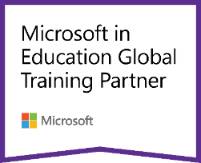Whether you’re new to the field or a seasoned professional, mastering Microsoft Fundamentals can help jump-start your career while earning globally recognized and industry-endorsed Microsoft certifications.
 The courses offer self-paced lecture videos, interactive labs, practice exams, live
instructor office hours, and additional in course resources.
The courses offer self-paced lecture videos, interactive labs, practice exams, live
instructor office hours, and additional in course resources.
Once you have completed the micro-credential, you are eligible to register and write the corresponding Microsoft Certification exam. You also receive a digital SURGE Micro-credential Badge which you can export to all your social media sites, LinkedIn, and your digital resumes.
Upskill your workforce today with custom Microsoft Training Solutions from Surge Micro-credentials. We can provide custom training on any Microsoft product and have expert Microsoft instructors ready to take your team to the next level. We offer a variety of delivery options including but not limited to in-person, online, pre-recorded, live-online, and hybrid. Contact stephanie.ross@saskpolytech.ca to book your custom Microsoft training solution.